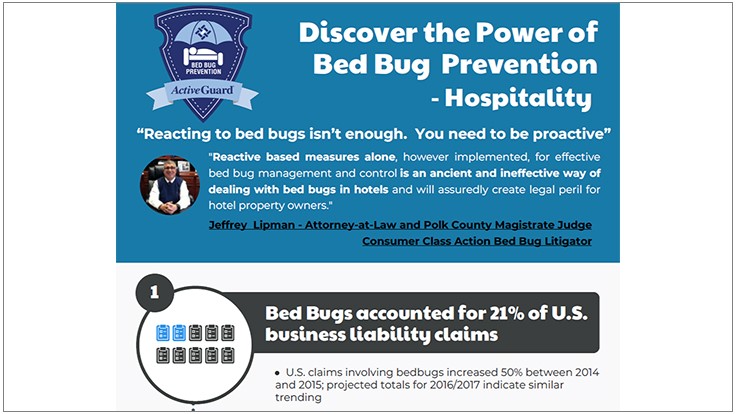Delving Into Advanced Techniques Employed By Pest Administration Professionals
Delving Into Advanced Techniques Employed By Pest Administration Professionals
Blog Article
Content By-Camp Caspersen
Are you tired of relying entirely on sprays to deal with parasites in your home or workplace? While sprays can be effective, pest control specialists have developed innovative techniques that surpass simply spraying chemicals.
These strategies not just give much more efficient and lasting services, however additionally concentrate on minimizing the use of unsafe chemicals. By exploring these sophisticated methods, you will certainly uncover a whole brand-new world of bug control approaches that are not only reliable, but additionally environmentally friendly.
So, are you all set to take your pest control game to the following degree?
Integrated Pest Management (IPM)
If you're seeking an efficient and environmentally-friendly strategy to pest control, Integrated Parasite Administration (IPM) is the remedy you require. IPM focuses on long-lasting avoidance and administration of pests, rather than merely relying upon pesticides. This method takes into consideration the certain demands and behaviors of parasites, in addition to the surrounding atmosphere.
By using a mix of methods such as organic control, environment adjustment, and targeted pesticide use, IPM aims to lower the reliance on chemical therapies and lessen harm to non-target microorganisms.
One essential element of IPM is keeping track of and identifying pests precisely. This entails frequently checking and evaluating the pest populace, as well as determining the details varieties existing. By recognizing the biology and behavior of insects, pest control professionals can establish targeted techniques to disrupt their life cycle and minimize their numbers.
One more vital aspect of IPM is utilizing non-chemical control approaches whenever possible. This can consist of physical obstacles, such as installing displays or sealing cracks and openings, to stop bugs from entering structures. In addition, cultural practices, like proper cleanliness and waste monitoring, can aid get rid of insect food sources and reproducing grounds.
When chemicals are needed, IPM concentrates on utilizing them deliberately and as a last hope. This means selecting the least poisonous and most reliable alternative, applying it exactly and only to affected areas, and complying with all safety and security guidelines. By reducing pesticide usage, IPM lowers the possible risks to human health and wellness and the environment.
Biological Control
To better improve the efficiency of Integrated Insect Administration (IPM), the next subtopic we'll check out is the approach of biological control. This method makes use of natural killers or parasites to regulate insects.
Below are pest killer of biological control:.
1. Intro of all-natural opponents: In this technique, beneficial pests or organisms are introduced to the location plagued with bugs. These all-natural adversaries prey on the insects, assisting to reduce their population.
2. Conservation of all-natural enemies: Rather than presenting brand-new microorganisms, this approach concentrates on developing an appropriate environment for existing useful insects. This can be accomplished with giving food, sanctuary, and water sources.
3. Augmentation: Here, the number of all-natural adversaries is boosted unnaturally by reproducing and launching them into the plagued area. This aids to swiftly lower the pest population.
4. Push-pull technique: This method combines repellents and attractants to adjust the actions of insects. https://seacoastcurrent.com/door-to-door-pest-solicitors-in-fremont-could-be-scammers/ push bugs away from crops, while attractants lure them towards catch crops or locations where they can be conveniently regulated.
Environment Alteration
Environment adjustment plays a vital duty in pest control by altering the environment to discourage pest infestations. By making changes to the physical features of a room, you can develop an unwelcoming setting for insects, making it harder for them to survive and flourish.
One typical method of habitat alteration is eliminating or reducing possible food sources for pests. This can consist of proper waste administration, sealing containers, and cleaning up food crumbs.
Additionally, getting rid of or minimizing areas of standing water can assist control insects like insects.
Transforming the landscape by cutting trees and bushes far from buildings can likewise prevent parasites from accessing your home.
Verdict.
So there you have it - the innovative methods utilized by insect control experts exceed simply spraying chemicals. Integrated Pest Administration (IPM) incorporates various methods to effectively control pests, while biological control utilizes all-natural opponents to keep pest populations in check.
https://docs.google.com/spreadsheets/d/1gu4ByGtghIofBNRz8YP_5WGzjsVBEXShijWYIWhrXN0/edit#gid=392590033 plays a crucial duty in stopping parasite infestations.
Did you recognize that according to a research study, implementing IPM techniques lowered chemical use by approximately 71%? This not only secures our health and the setting but additionally conserves cash in the long run.
